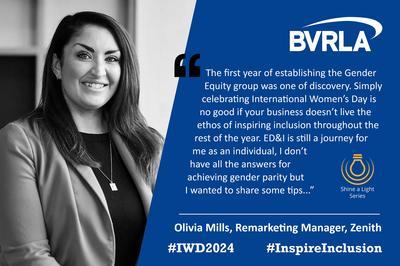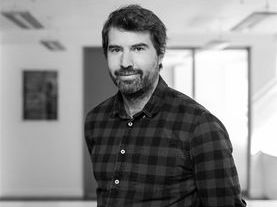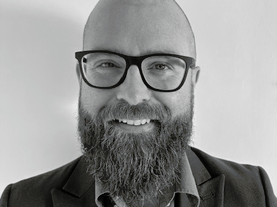Olivia Mills, Remarketing Manager and Gender Chair for Diversity and Inclusion at Zenith is part of the BVRLA’s Shine a Light series to celebrate International Women’s Day on 8 March. This year the theme is #InspireInclusion and Olivia talks about what this means to her and shares experiences of her Equality, Diversity and Inclusion (ED&I) involvement at Zenith. Olivia shares tips for a woman working to achieve equity and also sound advice for an ally.

What does Inspire Inclusion mean to me?
Creating an environment where everyone can be their “true self,” with visible encouragement and open support to achieve equity. Recognising that everyone’s needs are not the same. Understanding we don’t all come from the same starting point or even all want the same outcome. Appreciating the unique perspectives and contribution that brings.
My path to Equity, Diversity and Inclusion: a journey of learning
When Zenith established its ED&I Focus groups, I was compelled to join the Gender focus group, and was selected to Chair the group. My motivation came from the realisation of the impact being in a male dominated environment had on both my development and my personality. I wanted to share my experience with others in support of gender parity and recognition of the need for equity, often in cases where we don’t see the need ourselves in the moment.
When I started in Remarketing nearly 15 years ago, I hadn't come across any other female auction manager or female buyers at the time. I was very aware of how male dominated this environment was, but that didn’t bother me. Why should it?
However, I had started to mirror the stereotypical masculine behaviour I saw around me and as I was inexperienced, young, and usually the only female in the hall, I felt I had to present unquestionable certainty. I had developed a persona that didn’t show emotion or “weakness”, and as a result empathy was not my strongest attribute. I wasn’t showing my “true self” and was probably unaware of what that even meant.
Roll on 2019, I returned from maternity leave and came back into a people management role. Five months later, we went into lock down. I had to retrain some of my learnt behaviours - the need to show “strength” and always appear certain.
My team was struggling, as we all were, our world was turned on its head. After a particularly challenging day I shared with my team how much I was struggling and how hard I was finding it to balance everything. The light bulb moment came when my team couldn’t believe that I was struggling.
This knowledge had a profound impact on my leadership style. My perceived “weaknesses” of showing emotion and sharing my struggles was actually a strength. In a work capacity these weren’t behaviours I had previously experienced to positively mirror.
I now try to model these behaviours to encourage others and be the example I didn’t have. I share my struggles as a parent and ask for developmental feedback from those around me. I promote equity by giving space to understand other’s needs and giving appropriate support. Empathy and emotional intelligence are now attributes I’m proud to say are my strengths. I am fortunate to have fantastic support within Zenith through Women in Leadership training, allyship from Senior Leaders and the business’ promotion of ED&I, including the Women at Zenith network.
I often reflect on how this experience would have been different if I entered the industry today and if there had been greater female representation. This is my key motivator to support other women, encourage allyship and promote inclusion. As an industry we still need to do a lot of work to increase diversity and inclusion, however I have seen a notable increase in female representation, awareness of bias and support for the needs of individuals over the last 15 years. Now let’s keep it going!
Leading with Inclusion
The first year of establishing the Gender Equity group was one of discovery. Simply celebrating International Women’s Day is no good if your business doesn’t live the ethos of inspiring inclusion throughout the rest of the year. ED&I is still a journey for me as an individual, I don’t have all the answers for achieving gender parity but I wanted to share some tips if you, as a business or an individual are at the start of your inclusion journey.
Questions to ask when establishing a Focus Group:
- Who are we as a group?
- What are the businesses ambitions and how does it sit with the wider business objectives?
- How do the Leaders of the business inspire inclusion? It is key to lead by example
- What is our current position? Gather data to find your starting position. It is also important to discovery how people feel not just what the data tells you
- What do our internal and external communities need?
- Who can we externally partner with to support the journey and promote inclusion outside of the business?
Allyship is key! Everyone plays a role in achieving an inclusive environment, plus it benefits us all. Increasing the diversity within your talent pool increases the experience and views which promotes innovation for the business.
Advice for an ally:
Amplify their voice: allies can promote the ideas of individuals from underrepresented groups in meetings and discussions and give them credit for their contributions.
- Speak up: If you see bad behaviours don’t stand by. Call it out. Create safety as a leader. If you have responsibilities or requirements, share them openly. Such as sharing your need to leave work to pick up your child.
- Seek education through articles and books: Don’t make it the responsibility of others to educate you: I highly recommend “Change the Game" by Julia Muir and “Lean in: Women, Work and the Will to Work” by Sheryl Sandberg.
Advice for a woman working to achieve equity:
Question your self-limiting belief: What is the single biggest belief you have about yourself that is stopping you from getting what you want? Question the belief and reframe it. What could happen if you didn’t have this belief?
- Imposter syndrome is NOT a weakness! What does good enough look like to you? Are you fair on yourself? Gather accomplishment evidence to challenge it. Use your imposter syndrome as a strength, recognise and sit with why you feel an imposter. Work to realise how it makes your opinion unique and the strength and value in it. Even in writing this article I feel the imposter syndrome kicking in, but I have sat with it and here I am challenging it.
- Ask for feedback: Before a meeting you are participating in, or a project you are delivering, ask someone you trust to keep a note of motivational and developmental feedback they can share with you later.
I am always open to learning from others experience of ED&I and sharing my learnings. If you want to discuss any of the above or share your experiences, please reach out on LinkedIn.



